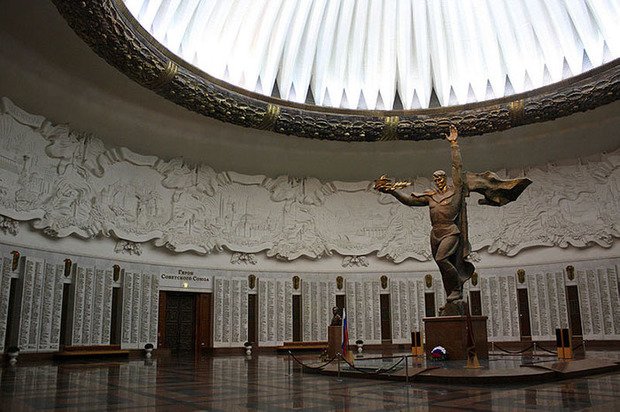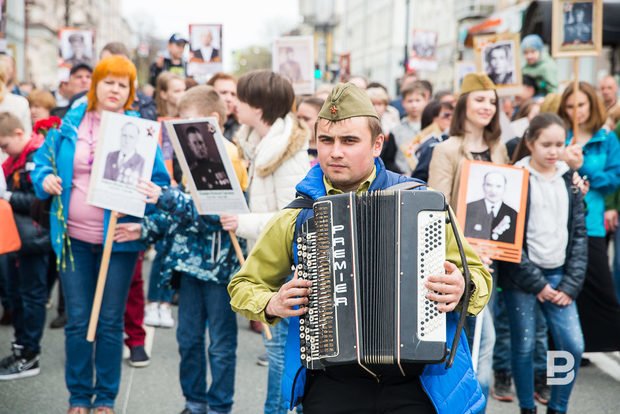''Veterans got benefits but had to keep silent''
Historian Irina Scherbakova on how popular memory of the war turned into ideology
There are almost no Great Patriotic War veterans left. This is why the living popular memory of it, as historians say, is almost running out. However, the memory of this tragic event has been used by authorities for many years for their own purposes when there were no other ideas that could unite the people. So was it after Perestroika and in the noughties. And today the memory of the war has turned into a dead ideology in which Stalin is a key figure of the 20 th century. Historian and head of youth and educational programmes of Memorial international civil rights society Irina Scherbakova said about this in detail in an interview with Realnoe Vremya.
''Museums even in Moscow represented the war memory in a conventional obsolete way''
Mrs Scherbakova, what's attitude of Russian society to the Great Patriotic War today?
Let's first talk about deep popular memory. It hasn't disappeared. What is a memory? It's the knowledge that there was a terrifying bloody event affecting all families in the 20 th century, 75 years ago. This memory, undoubtedly, lives among people, even if it hadn't been backed by any propaganda because the war left an indelible imprint on family history.
As for living memory, it's running out. Historians have such a concept as ''three-generation experience'', that's to say, living memory about an event is lost in three generations. There are almost no war veterans left. There are only 3-4 women in my circle who were teenagers during the war. It's people who are older than 90. There are no front-line soldiers.
Is family memory running out?
Family memory is usually ragged, fragmented. Letters from the front, some memories of a war veteran after the war are rarely conserved in a family. What can youngsters hear from their great-grandmothers today? At best (which is too much!), it's a story of wartime childhood and scarce information about where their great-grandfather fought. And it's very often unknown where they died. Millions died without leaving a trace, many of those who were back home quickly died from injuries, the majority of survivors simply said nothing. If a war veteran lived till the 70-80s, got a status of veteran, the family keeps his war awards – it's the best scenario of family memory. And scarce formal biographies created in the 70s.
What about museums, memorable dates and places?
There is plenty of such places, but they are identical, ''eternal flames'', stelae made decades ago. They were formalised in the Soviet era and later. Museums even in Moscow represented the war memory in a conventional, obsolete way. For instance, the War Museum at Poklonnaya Gora represents the official Brezhnev outlook on the war. And a modern-day schoolchild can't learn anything there, can't be surprised at anything at least virtually. This museum is very different from the museums created by a contemporary principle such as the Tolerance Center in Moscow or the contemporary exposition of the GULAG Museum.

''Museums even in Moscow represented the war memory in a conventional, obsolete way. For instance, the War Museum at Poklonnaya Gora represents the official Brezhnev outlook on the war.'' Photo: avgusttur.ru
What about films and books?
They aren't interesting not only for schoolchildren but for their 30-40-year-old parents as readers. They don't read the books a mass reader would read in the 60-80s. It's good war literature, it's sold, it can be found on the Internet. It's novels by Simonov, Bykov, Baklanov, Kondratyev's stories. It's also books about oral memory, Granin and Adamovich's The Siege Book, Svetlana Aleksiyevich's The Unwomanly Face of War, a huge number of aides-memoire. There were good war feature films that are from time to time are shown on television, for instance, Aleksey German's films. There are interesting films shot in the last decades, too. But it's not what our teenagers watch. I'm not talking about completely mythological blockbusters like T-34.
''Stalin became the main, key figure of the 20th century for a big number of people''
How did the idea of this war change after Perestroika and the dissolution of the USSR?
The deep popular memory about the war as a huge popular tragedy, a cruel battle was alive until those who witnessed it lived. Another thing is the official, formal and ideologically driven memory about the war that had no room for ''white spots''. We can say that some silent ''consensus'' was reached in the Brezhnev era: veterans got an official status, certain benefits but had to keep silent about any ''inconvenient'' memory – the terrifying price of the victory, the hardest defeats of the Red Army at the beginning of the war, about tragic fates of millions of Soviet prisoners of war and many other things that didn't fit the festive picture of the Great Patriotic War. But the memory of the war was discussed a lot in the Brezhnev era, the Communist ideology didn't work any more. The war was what anyway united the USSR, all peoples participated in it, including those who were repressed and deported.
The truth about the war, which was hidden previously, leaked out in the 90s — the numbers of the dead, the unfairness to former prisoners of war and former people driven off to compulsory labour to Germany, repressions, GULAG during the war… Everything that went by the board of official Soviet history.
Remember the biography of Solzhenitsyn's Ivan Denisovich, he is a former soldier who was in captivity. It is why he was repressed. It's a characteristic story. And such stories started to come to the fore in the 90s. And everything about official feats that had little to do with the attitude to the people's tragedy took a back seat.
We went back to Soviet propagandist patterns (they were widely used during the Afghan war) when the Chechnya war began, they had to explain and justify it. And it's not accidental that the victory's jubilee in 1995 was celebrated again almost like before Perestroika.
What happened in the 2000s?
In the early 2000s, everyone quickly understood not the memory of the Great Patriotic War but the pride for the victory was becoming a central point of a new patriotic ideology.
The victory in the war is the major historic event because of which millions of peoples are remembered in our country. It's not some unclear ''Unity Day''. Here one can get support and find a pillar. This isn't a defeat in the Cold War the USSR lost, this is not a collapse of the economy, not millions of repressions. The victory in the Great Patriotic War is what we can be proud of. And the new state ideology was built around this pride, simultaneously with the refusal of ideals of democracy and freedom we stopped talking about.
The memory of the war began to turn into ideology and absolutely empty, very primitive pride. It stopped being a characteristic of the people's tragedy. It became a symbol of that ''we've always won'', though it's a historical lie.
The cult of victory starts appearing. As this isn't history and memory but ideology, everything that did harm and damage in the eyes of Kremlin ideologists started to be removed from this official cult. An icon is an icon. One shouldn't look for spots and find out what happened in fact.
This is why scandals with mythological war heroes appeared because such a cult requires myths. But facts, documents – this only bothers. We've come to the prohibition against challenging the correctness of actions of Soviet authorities. Even corresponding protective laws are adopted! The Molotov–Ribbentrop Pact is justified, Stalin is praised.

''The memory about the war began to turn into ideology and absolutely empty, very primitive pride. It stopped being a characteristic of the people's tragedy.'' Photo: Maksim Platonov
What are the consequences of such prohibitions?
Nasty. The consequences are nasty for the people's self-consciousness. It helped revive a positive attitude to Stalin. Stalin became the main, key figure of the 20 th century for a big number of people. Not mass terror and millions of repressions are linked with this name. One can have a look at sociological surveys, the name of Stalin is linked with the victory in people's consciousness today.
But the nastiness of this situation is that Stalin is a symbol of victory only to some extent. First of all, he is a symbol of the cruel unmerciful state machine, a terrible vertical of power whose scale our history never saw. It can be defined only with one phrase – ''state is all, a human is nothing''. This is why it's a very dangerous symbol.